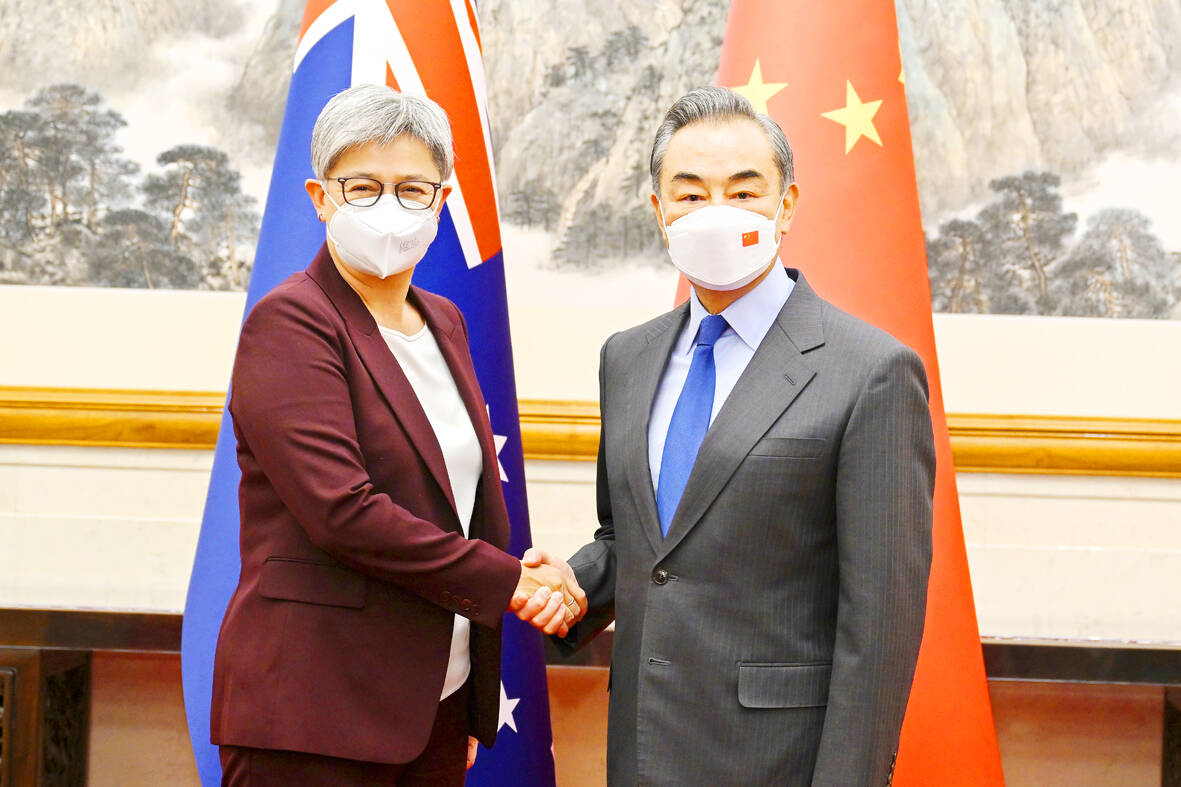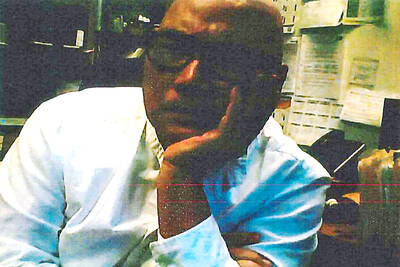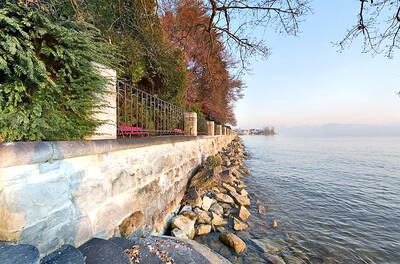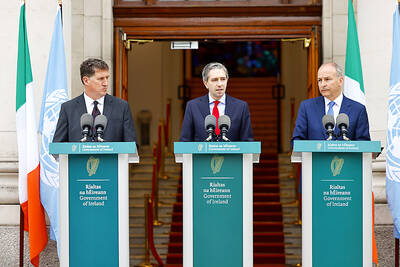The visit of Australian Minister for Foreign Affairs Penny Wong (黃英賢) to Beijing this week cemented a surprisingly fast thaw in diplomatic relations with China, although it remains to be seen whether the summit might result in a loosening of trade barriers that were created in the two countries’ recent feud.
Strolling through a frigid Beijing park on Wednesday, Wong responded to a reporter’s question on the state of ties by noting “the ice thaws, but slowly.”
Still, that she spoke those words ahead of a meeting in the Chinese capital highlights the changed atmosphere since the Australian Labor Party won office in May.

Photo: AP
Her ministerial predecessors in Australia’s former conservative coalition government could not get Chinese officials to take their calls, let alone meet for talks in Beijing.
Wong’s visit was the first by an Australian minister in almost four years, even as China remains Australia’s biggest trading partner.
Her visit, coming on the back of Chinese President Xi Jinping’s (習近平) first in-person summit with US President Joe Biden in Bali, Indonesia, last month, has led to speculation that Xi is trying to repair ties with the West and move back to a lower-key diplomatic strategy.
Xi has also sought to improve links with leaders of top US allies, including Japanese Prime Minister Fumio Kishida and Australian Prime Minister Anthony Albanese.
Jiang Yun (姜雲), China Matters Fellow at the Australian Institute of International Affairs, said she had been surprised at the speed of the rapprochement.
“When you see frozen relationships, it usually takes a while,” she said. “Even though there has been no change in government policy, the rhetoric has been toned down a lot.”
In the preceding six years, Australia and China’s relationship had gone from bad to worse as Beijing’s more assertive regional stance ran up against a security-conscious Canberra that began restricting foreign investment and fretted about espionage.
As the relationship unraveled, two Australian citizens were arrested on spying charges in China — journalist Cheng Lei (成蕾) and writer Yang Hengjun (楊恒均) — and Beijing imposed punitive trade actions on Australian commodities including coal, barley, lobsters and wine.
Former Australian prime minister Scott Morrison responded to the mounting tensions by cementing ties with the US through the AUKUS security pact that also includes the UK and the Quadrilateral Security Dialogue partnerships, and seeking to diversify Australia’s trade relationships away from China.
Wong’s trip to Beijing was ostensibly a celebration of 50 years of diplomatic relations between the two countries. She unveiled a commemorative envelope on Wednesday to mark the anniversary together with Chinese Minister of Foreign Affairs Wang Yi (王毅).
In meetings that followed, they agreed to new bilateral dialogues on diplomatic relations, consular affairs, trade and economic issues, climate change, defense, and regional and international issues.
Ahead of Labor’s victory in May, as the then opposition spokesperson, Wong had said she wanted to turn down the temperature of relations with Beijing.
However, there had been little expectation of improved ties.
Morrison’s conservative government had tried to make its tough stance a point of political difference with Labor, saying that then-Australian leader of the opposition Albanese would be “weak” on China.
The government accused Labor Party Deputy Leader Richard Marles of being a “Manchurian candidate” for having given speeches in Beijing.
Shortly after Labor’s victory, Albanese received a message of congratulations from Chinese Premier Li Keqiang (李克強).
In November, Albanese met with Xi on the sidelines of the G20 summit.
Yet many of the difficulties remain unresolved between the two countries.
Experts have said any relaxation of the trade restrictions would likely be done unofficially at a later date.
Both sides have taken their disputes to the WTO, which could take time to resolve, further stymieing efforts to restart trade.
Wong is still pressing for consular access for the two Australians held.
Meanwhile, there are no journalists for Australian media in China, after the final two fled the country in 2020 after being interrogated by the Chinese Ministry of State Security after Australian security officials raided the homes of Chinese state media journalists.
Jiang said clashes over foreign investment by Chinese companies in Australia is also likely to test the new consensus.
Australian Treasurer Jim Chalmers has already flagged restrictions on international funding for critical minerals projects.
Jennifer Hsu, project director at the Lowy Institute, said there has also been no sign from Australia that it would be willing to compromise on security and human rights.
She said that even though ties have been normalized, Australia and China are unlikely to return to the diplomatic footing prior to the downward spiral.
“The world has changed,” Hsu said. “I don’t think Australia-China relations will go back to where it was five, six years ago.”

A former CIA agent on Friday pleaded guilty to spying for China, the US Department of Justice announced. Alexander Ma (馬玉清), 71, a native of Hong Kong who became a naturalized US citizen, admitted to having provided “a large volume of classified US national defense information” to Chinese authorities in 2001, even though he had not been employed by the CIA for 12 years, the department said in a statement. Ma’s meeting with representatives of the Shanghai State Security Bureau was initiated by another former CIA agent, Ma’s blood relative who was born in Shanghai and who also became a naturalized American,

A female jogger was killed by a naked man who was screaming and attacking people in a lakeside park in a normally tranquil Swiss village, police said on Wednesday. The attack happened on Tuesday evening in Mannedorf on Lake Zurich, about 20km southeast of Zurich, cantonal police said. A 19-year-old suspect has been arrested. “Shortly before 8pm, passersby reported a man in Alma Park who was running around naked, screaming and physically attacking other people,” police said. “The emergency services who quickly arrived on site found a seriously injured woman lying on the ground,” they said. “Despite immediate resuscitation, the woman died from her serious

COORDINATED MOVE: Irish Prime Minister Simon Harris said other countries might join Ireland, Norway and Spain in recognizing a Palestinian state ‘in the weeks ahead’ Norway, Ireland and Spain yesterday recognized a Palestinian state in a historic move that drew condemnation from Israel and jubilation from the Palestinians. Israel ordered back its ambassadors from Norway and Ireland. It was a lightning cascade of announcements. First Norwegian Prime Minister Jonas Gahr Store said that “there cannot be peace in the Middle East if there is no recognition.” The Scandinavian country is to officially recognize a Palestinian state as of Tuesday next week, Gahr Store said. “By recognizing a Palestinian state, Norway supports the Arab peace plan,” he said. Several EU countries have in the past weeks indicated that they

DEADLY INCIDENT: The plane made an emergency landing at a Bangkok airport after turbulence which caused the death of a passenger Travelers and crew yesterday landed in Singapore after a terrifying high-altitude plunge on a flight from London during which an elderly passenger died and more than 80 were injured. Singapore Airlines Flight SQ321 on Tuesday hit “sudden extreme turbulence” over Myanmar 10 hours into its journey, abruptly rising and plunging several times. People were thrown around the cabin so violently they put dents in the ceiling during the drama at 11,300m, leaving dozens with head injuries, one passenger said. Photos from inside the plane showed the cabin in chaos, strewn with food, drinks bottles and luggage, and with oxygen masks dangling from